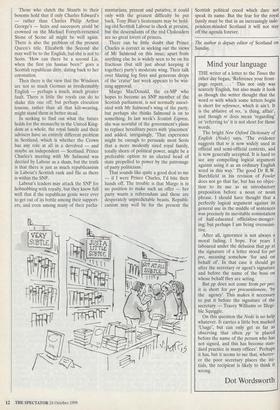Mind your language
THE writer of a letter to the Times the other day began, 'Reference your front- page report.. . . ' This not only was scarcely English, but also made it look as though the writer thought that the word re with which some letters begin is short for reference, which it ain't. It is the ablative of res, 'a thing, affair', and though re does mean 'regarding' or 'referring to' it is not short for those words.
The bright New Oxford Dictionary of English (Node) says, 'The evidence suggests that re is now widely used in official and semi-official contexts, and is now generally accepted. It is hard to see any compelling logical argument against using it as an ordinary English word in this way.' The good Dr R.W. Burchfield in his revision of Fowler does not go that far, but has no objec- tion to its use as an introductory preposition before a noun or noun phrase. I should have thought that a perfectly logical argument against its general use in the middle of sentences was precisely its inevitable connotation of half-educated officialese-monger- ing; but perhaps I am being oversensi- tive.
After all, ignorance is not always a moral failing, I hope. For years I laboured under the delusion that pp at the signature of a letter stood for per pro, meaning somehow 'for and on behalf of'. In that case it should go after the secretary or agent's signature and before the name of the boss on whose behalf they are acting.
But pp does not come from per pro; it is short for per procurationem, 'by the agency'. This makes it necessary to put it before the signature of the secretary — Tracey Williams or Illegi- ble Squiggle.
On this question the Node is no help whatever. It carries a little box marked 'Usage', but can only get as far as observing that often pp 'is placed before the name of the person who has not signed, and this has become stan- dard practice in many offices'. Perhaps it has, but it seems to me that, wherev- er the poor secretary places the ini- tials, the recipient is likely to think it wrong.
Dot Wordsworth


















































































 Previous page
Previous page